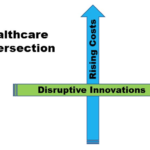 During a recent long-haul flight from east to west coast, I watched the movie The Matrix. I had never seen this 1999 SciFi film, but felt I should since the characters and story often crop up in popular culture. The plot revolves around a world where artificial intelligence machines have trapped humans in a simulated reality, the Matrix. A few computer hackers break out of the Matrix and stage a revolt against the machines. The film is particularly well known for its visual effects, which include bending time and space in the Matrix to slow bullets and martial arts moves. Fortunately, our reality almost 20 years later includes more innocuous digital tools and artificial intelligence.
During a recent long-haul flight from east to west coast, I watched the movie The Matrix. I had never seen this 1999 SciFi film, but felt I should since the characters and story often crop up in popular culture. The plot revolves around a world where artificial intelligence machines have trapped humans in a simulated reality, the Matrix. A few computer hackers break out of the Matrix and stage a revolt against the machines. The film is particularly well known for its visual effects, which include bending time and space in the Matrix to slow bullets and martial arts moves. Fortunately, our reality almost 20 years later includes more innocuous digital tools and artificial intelligence.
What is Digital Health?
Unlike the Matrix, digital health makes human lives better. Digital health includes hardware and software solutions and services that enhance healthcare delivery and enable personalized or precision health. It includes use of familiar technologies like email, mobile devices and applications (apps), and clinic-based or remote monitoring devices or sensors to improve health and wellness. If you use hardware or software for clinical decision support, telemedicine, or patient portals, then you are using digital health tools.
Digital Health and the FDA
According to the U.S. Food and Drug Administration (FDA) digital health includes mobile health (mhealth), health IT, wearable devices, telehealth/telemedicine, and personalized medicine. The FDA is interested in patient and consumer use of digital health to better manage and track personal health and wellness. In addition, the government as a large health care payer expects digital health technologies to:
- Reduce health care inefficiencies
- Improve access to care
- Reduce health care costs
- Improve the quality of care delivered
- Make medicine more personalized
This is all good, but regulation has struggled to keep pace with this convergence of devices, connectivity, and consumer technology.
The FDA has oversight of medical devices, which has led to some confusion about regulation of some digital health tools. The 21st Century Cures Act (H.R 34 SEC 3060) passed by congress in December 2016 provides clarification of the scope of FDA regulation in digital health; specifically some software is exempted from FDA regulation. Digital health software such as an EHR and personal devices supporting healthy lifestyle, wellness, and fitness are exempt from FDA device regulation. The FDA Center for Devices and Radiological Health (CDRH) is developing a “Digital Health Program” to publish detailed regulatory strategies and polices based on new congressional guidance in the 21st Century Cures Act.
Are your patients asking about digital health?
As FDA and other health care stakeholders are convinced that digital health can improve care delivery and lower costs, they are hoping to engage consumers in actively seeking digital health solutions. The Federal Communications Commission (FCC) Connect2Health Task Force has a mission to “…accelerate the adoption of advanced health care technologies.” To encourage consumers to get involved the task force has published “Five Questions You Can Ask Your Doctor About Digital Health.” Your patients might ask you this:
- I’ve heard that digital tools can help me get healthier or stay well. What can you tell me about digital health?
- Are there any digital health tools that would be particularly useful given my diagnosis?
- Does your practice have a patient portal?
- Does your patient portal include e-visits?
- What are the best sources of health information for patients on the Web?
I wasn’t sure how to answer the question about e-visits, so it was helpful to read that this means the portal enables email, text, or video communication between patients and providers.
Digital health innovation
New digital health apps, software, sensors, and analytics are emerging daily. Here are Health IT Consultant digital health innovation headlines from the past month:
Groove Health Lands $1.5M to Improve Medication Adherence Using Predictive Analytics
WellDoc, AADE Jointly Launch The Diabetes Digital Health Learning Network
4 Ways Augmented Reality Will Transform the Medical World
Fruit Street Health Lands $3M to Expand Telehealth Platform for Lifestyle & Obesity Medicine
Accenture, Roche to Develop Data-Driven Analytics Platform for Diabetes Patients
AxisPoint Health, mPulse Mobile Partner on Digital Health App for Member Engagement
ATI Physical Therapy Launches Industry’s First Patient Experience Mobile App
Many of these are apps and programs for payers or direct to consumer, but some tools will be marketed to providers. Here is a digital health product that might interest you:
SERMO Launches Drug Ratings Search by FDA-Approved Indications for Physicians
“Physicians can now examine the drug’s overall rating, as well as see how other physicians rank classes and drugs on efficacy, safety, tolerability, accessibility, and adherence. This benefit enables physicians to find information as quickly or in as much detail as they need.
Since Drug Ratings launched in May, SERMO physicians have submitted an additional 100,000 ratings, bringing the total to 350,000, and an additional 3,000 comments, raising the number of insights to 23,000. An additional 23,355 physicians from 97 countries have searched the database to read peer reviews in that time. The database now includes over 3,000 drugs rated and ranked, more than 1,000 of which have over 100 ratings.
For example, if a patient were to walk into a doctor’s office today with hypercholesterolemia, the treating physician could quickly query the Drug Ratings database right from the exam room to see what other doctors think of the available FDA-approved treatment options. They would see that statins are among the highest ranked drug classes for the condition, and that while physicians rate Crestor as the single best approved drug generally, Lipitor is ranked higher on accessibility—a subtlety that may be very important for some patients.”
Why is digital health growing now?
In May The Economist published an article about digital health progress. The author describes an innovative partnership between the American Heart Association and Amazon, which enhances the Echo “personal assistant” Alexa to provide CPR instructions. You can enable Alexa with responses to “Alexa, start CPR” as well as “Alexa, open BMI calculator or open Smart Symptom Tracker.” Such partnerships may help health care catch up with technology that enhances other aspects of daily life. Health care has drifted behind in part because it is highly regulated and it is an expensive innovation space. Forces are now in place that make digital health innovation possible, including the need to control health care costs, consumer readiness, and the prevalence of smart mobile devices.
According to The Economist there are 3 groups battling for control of the “health-care value chain”:
- “Traditional” healthcare innovators like hospital systems, GE Healthcare, Siemens, and Phillips
- “Incumbents” like health insurers and pharmacy-benefit managers (PBMs)
- “Insurgents” like Google, Apple, and Amazon
All stakeholders will be able to reach consumers directly as innovations promote wellness behaviors and assist consumers in aggregating and controlling personal health data. While Congress has lightened the regulatory burden, concerns about data accuracy, privacy, and security will continue to put some brakes on digital health progress.
In a recent FDA Voice blog post, FDA Commissioner Scot Gottlieb noted that 165,000 health-related apps for smartphones were available in 2016. Apps empowered consumers by providing personal monitoring and data access. They supported efficient care delivery by providing decision support and workflow tools, and they enhance public health disease identification and management. He suggests that the FDA is working to modernize the approach to regulation of digital health technology to encourage rapid innovation.
Do you use digital health? Will digital health improve or impede care in your practice? Are you concerned about safety and privacy with digital health tools? Are patients asking you about digital health? Let us know what’s happening in your world.
Today digital health is part of our reality, not the simulated reality of the Matrix….or is it? Seriously, you should watch The Matrix—it’s a classic.
 Dugan Maddux, MD, FACP, is the Vice President for CKD Initiatives for FMC-NA. Before her foray into the business side of medicine, Dr. Maddux spent 18 years practicing nephrology in Danville, Virginia. During this time, she and her husband, Dr. Frank Maddux, developed a nephrology-focused Electronic Health Record. She and Frank also developed Voice Expeditions, which features the Nephrology Oral History project, a collection of interviews of the early dialysis pioneers.
Dugan Maddux, MD, FACP, is the Vice President for CKD Initiatives for FMC-NA. Before her foray into the business side of medicine, Dr. Maddux spent 18 years practicing nephrology in Danville, Virginia. During this time, she and her husband, Dr. Frank Maddux, developed a nephrology-focused Electronic Health Record. She and Frank also developed Voice Expeditions, which features the Nephrology Oral History project, a collection of interviews of the early dialysis pioneers.
Photo from www.canstockphoto.com




Leave a Reply